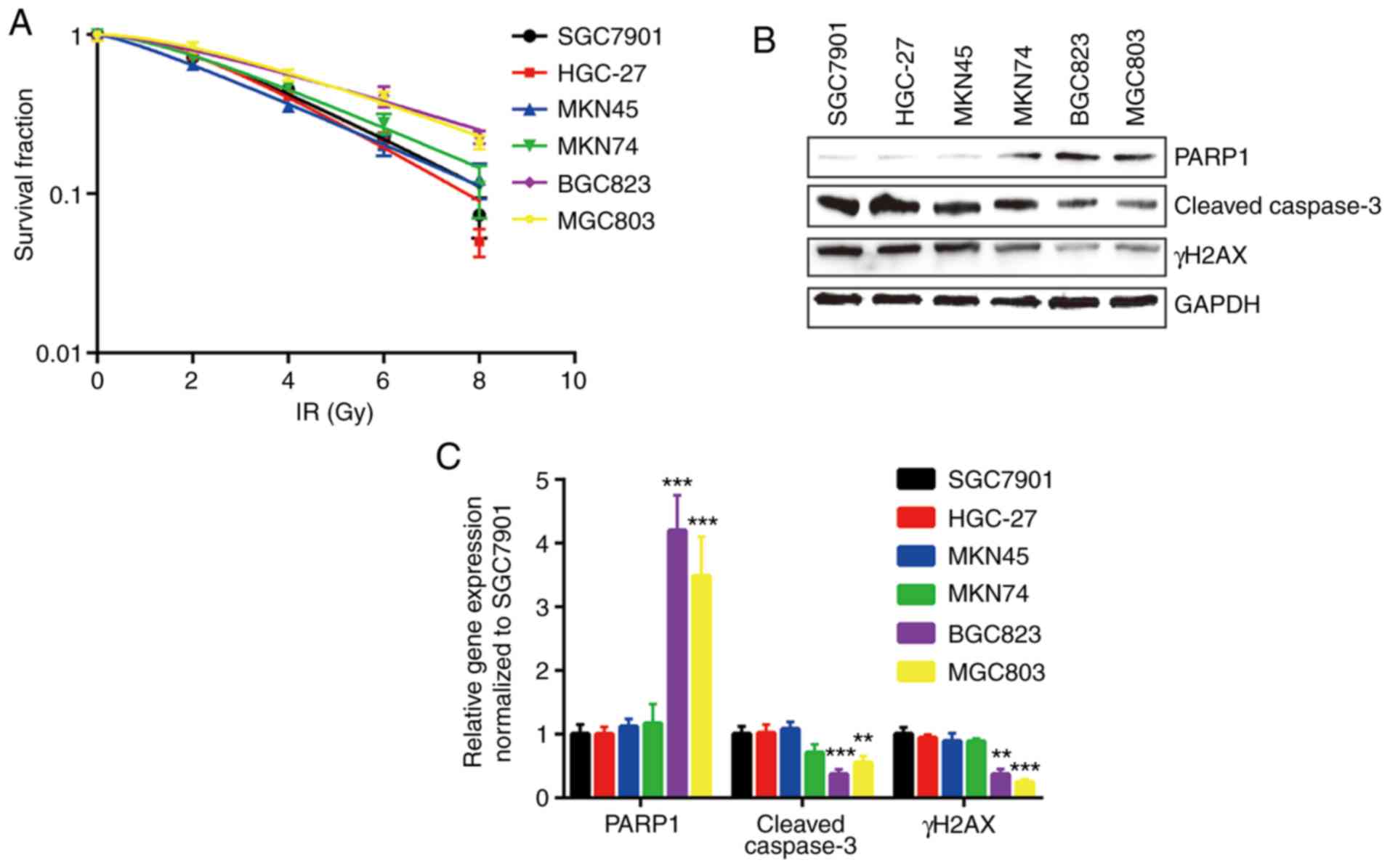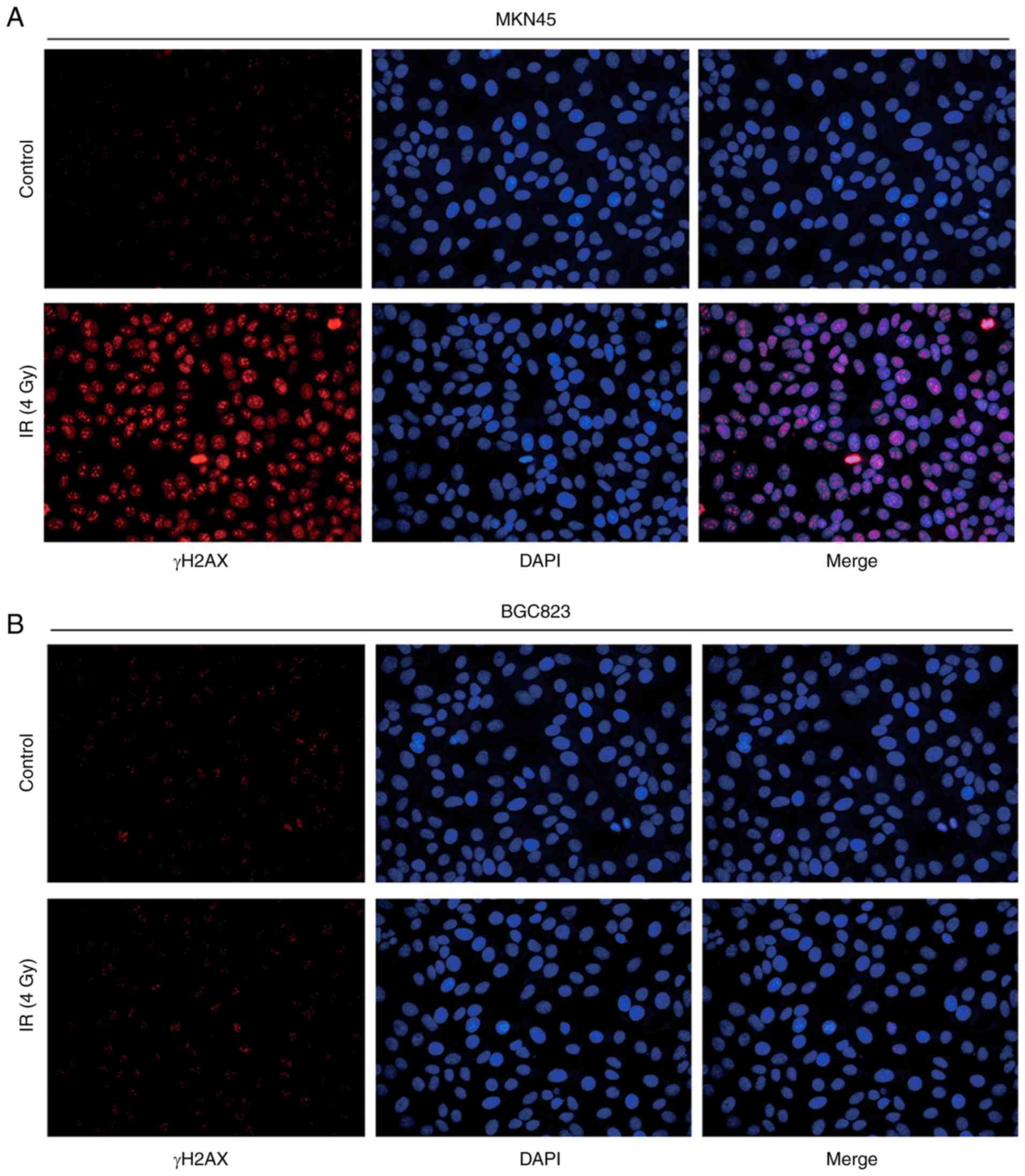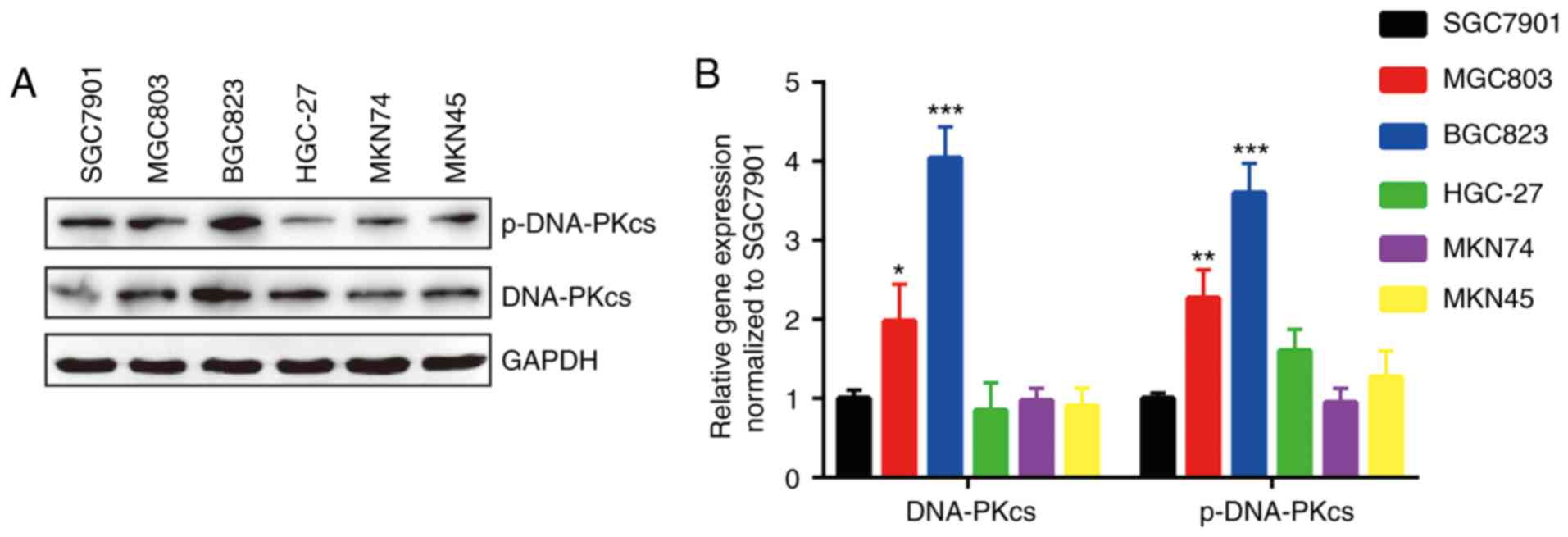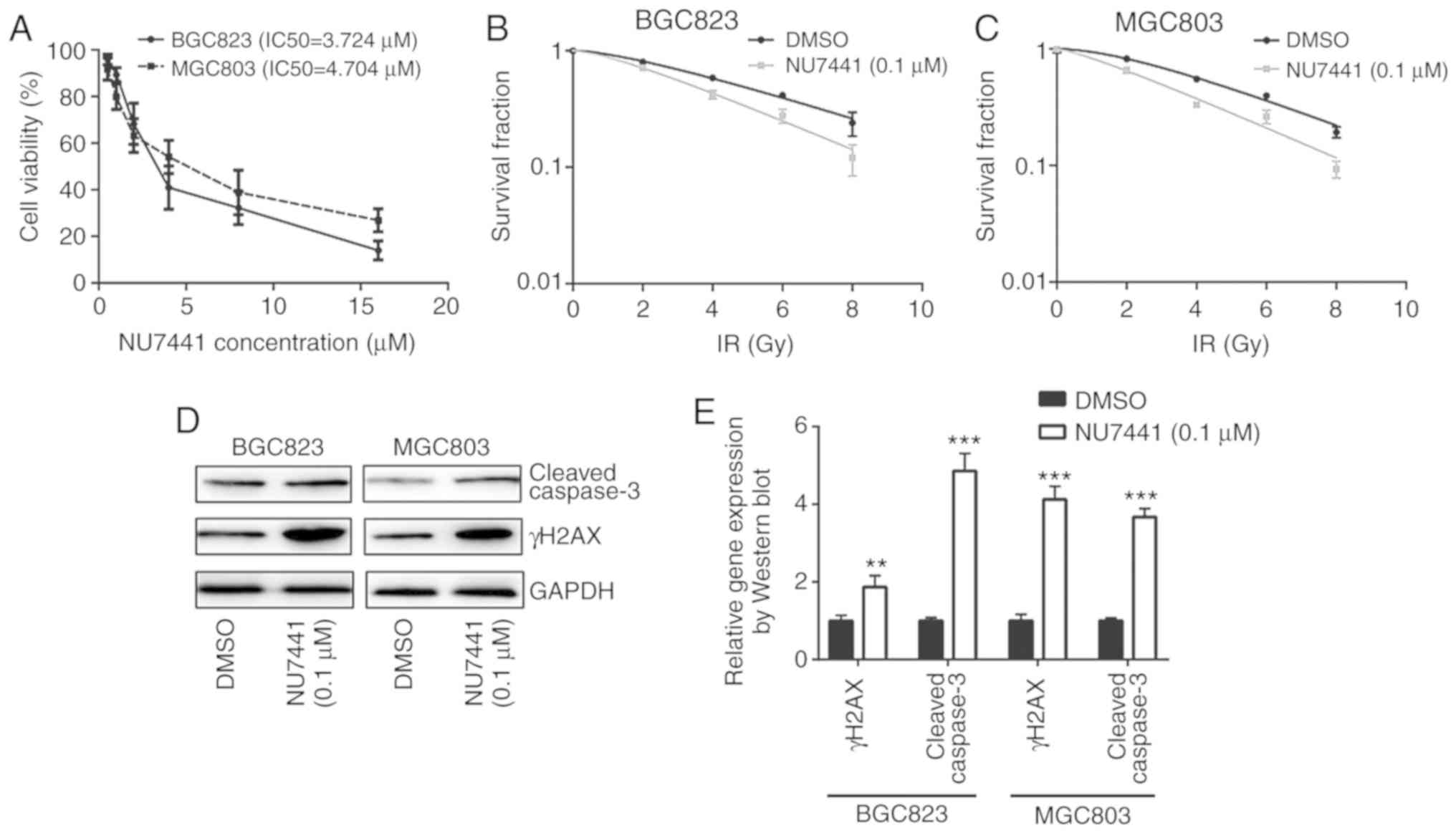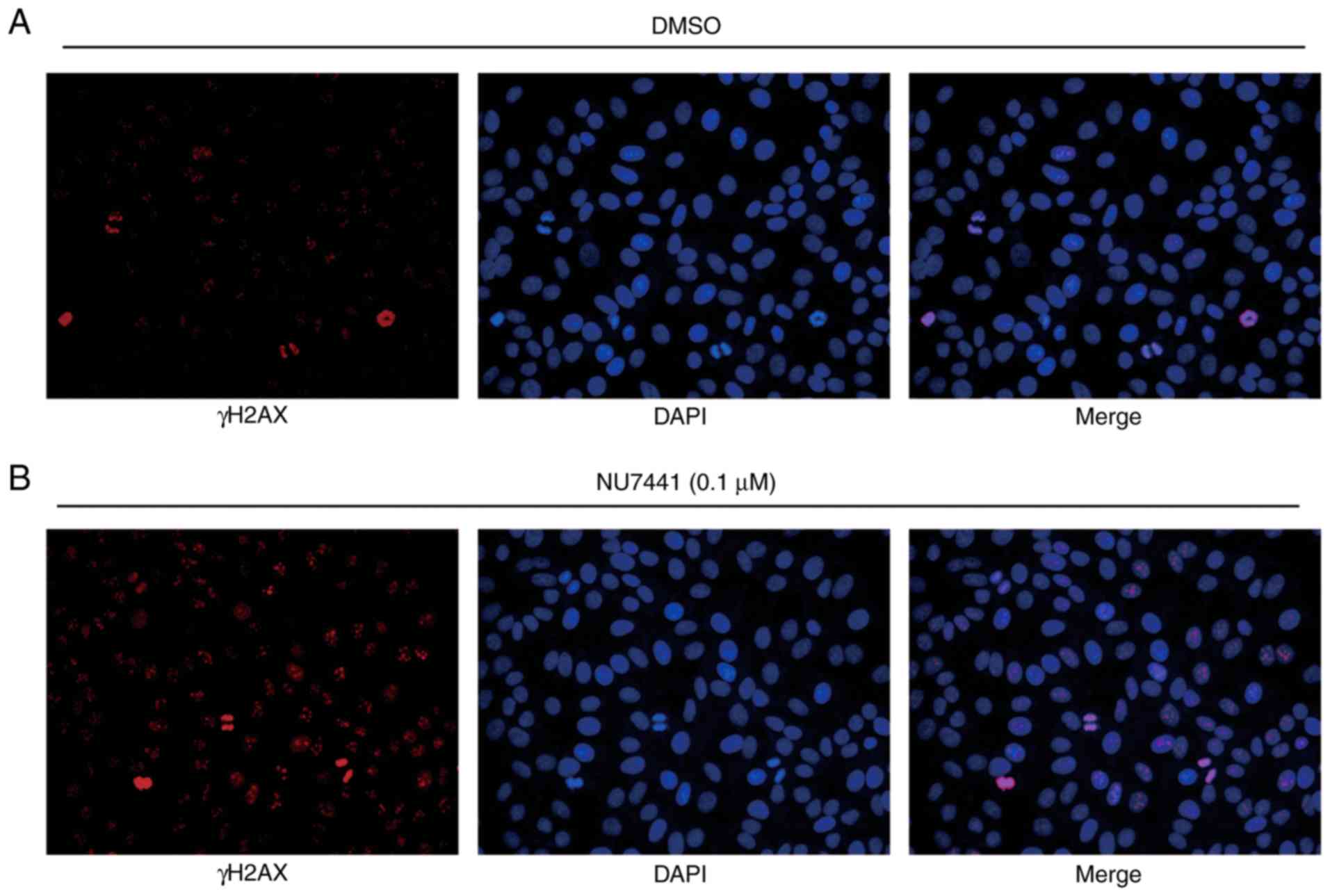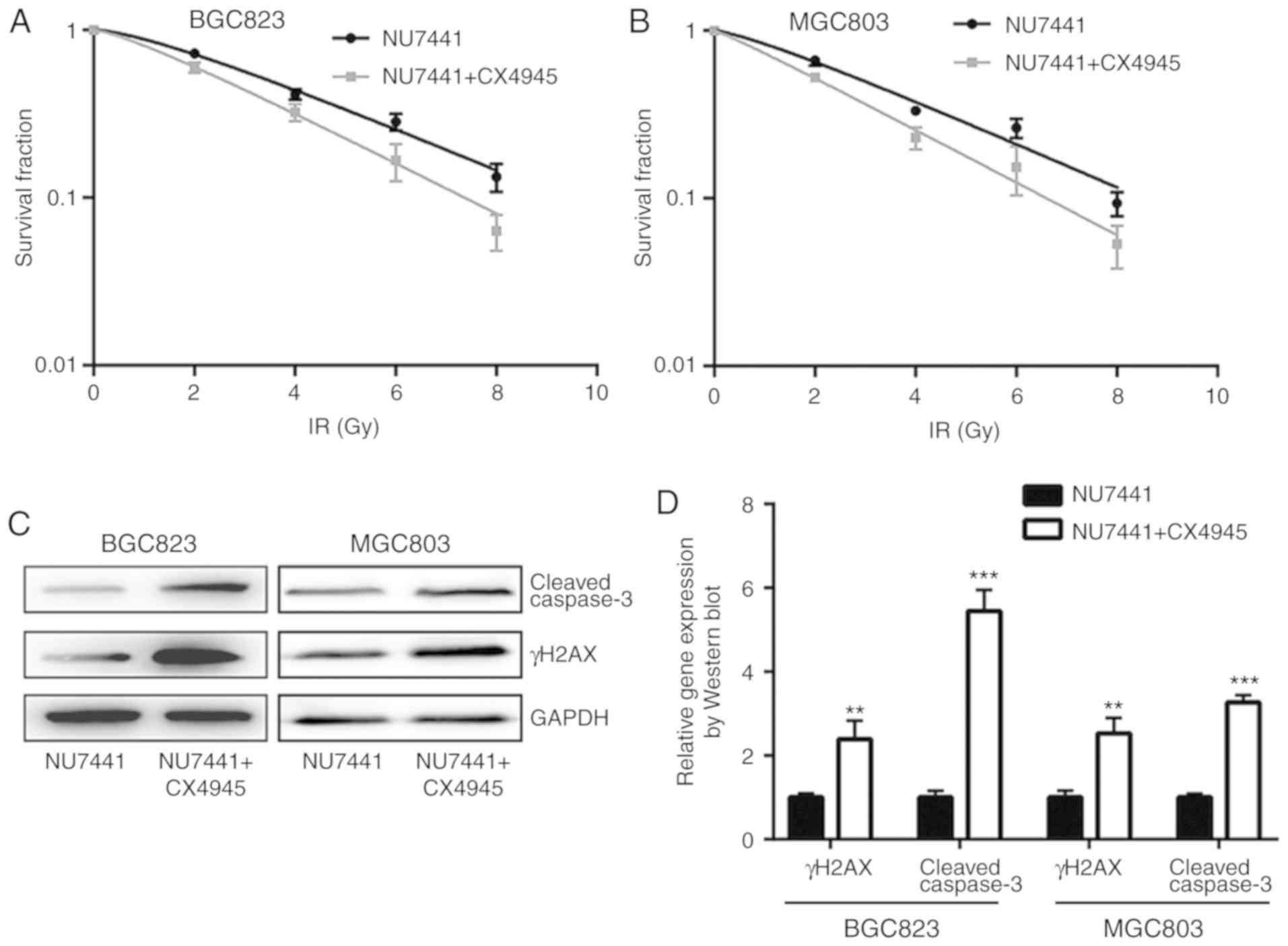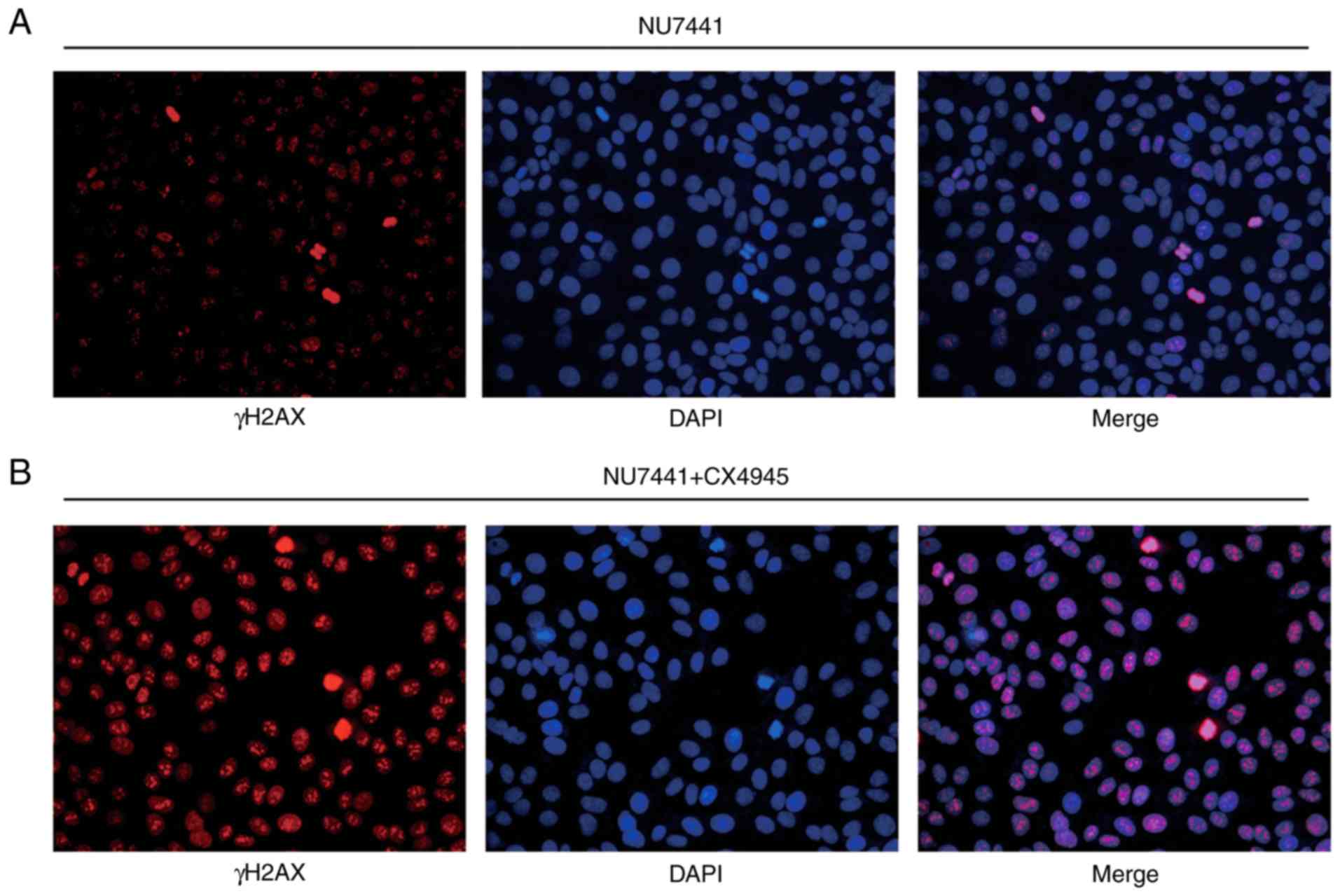|
1
|
Torre LA, Bray F, Siegel RL, Ferlay J,
Lortet-Tieulent J and Jemal A: Global cancer statistics, 2012. CA
Cancer J Clin. 65:87–108. 2015. View Article : Google Scholar : PubMed/NCBI
|
|
2
|
Yeh JM, Kuntz KM, Ezzati M, Hur C, Kong CY
and Goldie SJ: Development of an empirically calibrated model of
gastric cancer in two high-risk countries. Cancer Epidemiol
Biomarkers Prev. 17:1179–1187. 2008. View Article : Google Scholar : PubMed/NCBI
|
|
3
|
Macdonald JS, Smalley SR, Benedetti J,
Hundahl SA, Estes NC, Stemmermann GN, Haller DG, Ajani JA,
Gunderson LL, Jessup JM and Martenson JA: Chemoradiotherapy after
surgery compared with surgery alone for adenocarcinoma of the
stomach or gastroesophageal junction. N Engl J Med. 345:725–730.
2001. View Article : Google Scholar : PubMed/NCBI
|
|
4
|
Toiyama Y, Tanaka K, Konishi N, Mohri Y,
Tonouchi H, Miki C and Kusunoki M: Administration
sequence-dependent antitumor effects of paclitaxel and
5-fluorouracil in the human gastric cancer cell line MKN45. Cancer
Chemother Pharmacol. 57:368–375. 2006. View Article : Google Scholar : PubMed/NCBI
|
|
5
|
Hartgrink HH, Jansen EP, van Grieken NC
and van de Velde CJ: Gastric cancer. Lancet. 374:477–490. 2009.
View Article : Google Scholar : PubMed/NCBI
|
|
6
|
Valentini V and Cellini F: Radiotherapy in
gastric cancer: A systematic review of literature and new
perspectives. Expert Rev Anticancer Ther. 7:1379–1393. 2007.
View Article : Google Scholar : PubMed/NCBI
|
|
7
|
Garg AK, Buchholz TA and Aggarwal BB:
Chemosensitization and radiosensitization of tumors by plant
polyphenols. Antioxid Redox Signal. 7:1630–1647. 2005. View Article : Google Scholar : PubMed/NCBI
|
|
8
|
Dai Y and Grant S: New insights into
checkpoint kinase 1 in the DNA damage response signaling network.
Clin Cancer Res. 16:376–383. 2010. View Article : Google Scholar : PubMed/NCBI
|
|
9
|
Liu P, Gan W, Guo C, Xie A, Gao D, Guo J,
Zhang J, Willis N, Su A, Asara JM, et al: Akt-mediated
phosphorylation of XLF impairs non-homologous end-joining DNA
repair. Mol Cell. 57:648–661. 2015. View Article : Google Scholar : PubMed/NCBI
|
|
10
|
Zhang S, Matsunaga S, Lin YF, Sishc B,
Shang Z, Sui J, Shih HY, Zhao Y, Foreman O, Story M, et al:
Spontaneous tumor development in bone marrow-rescued
DNA-PKcs(3A/3A) mice due to dysfunction of telomere leading strand
deprotection. Oncogene. 35:3909–3918. 2016. View Article : Google Scholar : PubMed/NCBI
|
|
11
|
Lee SH and Kim CH: DNA-dependent protein
kinase complex: A multifunctional protein in DNA repair and damage
checkpoint. Mol Cells. 13:159–166. 2002.PubMed/NCBI
|
|
12
|
Bouchaert P, Guerif S, Debiais C, Irani J
and Fromont G: DNA-PKcs expression predicts response to
radiotherapy in prostate cancer. Int J Radiat Oncol Biol Phys.
84:1179–1185. 2012. View Article : Google Scholar : PubMed/NCBI
|
|
13
|
Peng Y, Zhang Q, Nagasawa H, Okayasu R,
Liber HL and Bedford JS: Silencing expression of the catalytic
subunit of DNA-dependent protein kinase by small interfering RNA
sensitizes human cells for radiation-induced chromosome damage,
cell killing, and mutation. Cancer Res. 62:6400–6404.
2002.PubMed/NCBI
|
|
14
|
Toulany M, Kehlbach R, Florczak U, Sak A,
Wang S, Chen J, Lobrich M and Rodemann HP: Targeting of AKT1
enhances radiation toxicity of human tumor cells by inhibiting
DNA-PKcs-dependent DNA double-strand break repair. Mol Cancer Ther.
7:1772–1781. 2008. View Article : Google Scholar : PubMed/NCBI
|
|
15
|
Lee SW, Cho KJ, Park JH, Kim SY, Nam SY,
Lee BJ, Kim SB, Choi SH, Kim JH, Ahn SD, et al: Expressions of Ku70
and DNA-PKcs as prognostic indicators of local control in
nasopharyngeal carcinoma. Int J Radiat Oncol Biol Phys.
62:1451–1457. 2005. View Article : Google Scholar : PubMed/NCBI
|
|
16
|
Bjork-Eriksson T, West C, Nilsson A,
Magnusson B, Svensson M, Karlsson E, Slevin N, Lewensohn R and
Mercke C: The immunohistochemical expression of DNA-PKCS and Ku
(p70/p80) in head and neck cancers: Relationships with
radiosensitivity. Int J Radiat Oncol Biol Phys. 45:1005–1010. 1999.
View Article : Google Scholar : PubMed/NCBI
|
|
17
|
Eriksson A, Lewensoh R, Larsson R and
Nilsson A: DNA-dependent protein kinase in leukaemia cells and
correlation with drug sensitivity. Anticancer Res. 22:1787–1793.
2002.PubMed/NCBI
|
|
18
|
Tu Y, Ji C, Yang B, Yang Z, Gu H, Lu CC,
Wang R, Su ZL, Chen B, Sun WL, et al: DNA-dependent protein kinase
catalytic subunit (DNA-PKcs)-SIN1 association mediates ultraviolet
B (UVB)-induced Akt Ser-473 phosphorylation and skin cell survival.
Mol Cancer. 12:1722013. View Article : Google Scholar : PubMed/NCBI
|
|
19
|
Xu JY, Lu S, Xu XY, Hu SL, Li B, Qi RX,
Chen L and Chang JY: Knocking down nucleolin expression enhances
the radiosensitivity of non-small cell lung cancer by influencing
DNA-PKcs activity. Asian Pac J Cancer Prev. 16:3301–3306. 2015.
View Article : Google Scholar : PubMed/NCBI
|
|
20
|
Strom CE, Mortusewicz O, Finch D, Parsons
JL, Lagerqvist A, Johansson F, Schultz N, Erixon K, Dianov GL and
Helleday T: CK2 phosphorylation of XRCC1 facilitates dissociation
from DNA and single-strand break formation during base excision
repair. DNA Repair (Amst). 10:961–969. 2011. View Article : Google Scholar : PubMed/NCBI
|
|
21
|
Zhang ZX, Gu XZ, Yin WB, Huang GJ, Zhang
DW and Zhang RG: Randomized clinical trial on the combination of
preoperative irradiation and surgery in the treatment of
adenocarcinoma of gastric cardia (AGC)-report on 370 patients. Int
J Radiat Oncol Biol Phy. 42:929–934. 1998. View Article : Google Scholar
|
|
22
|
Moran JM, Elshaikh MA and Lawrence TS:
Radiotherapy: What can be achieved by technical improvements in
dose delivery? Lancet Oncol. 6:51–58. 2005. View Article : Google Scholar : PubMed/NCBI
|
|
23
|
Kurimasa A, Kumano S, Boubnov NV, Story
MD, Tung CS, Peterson SR and Chen DJ: Requirement for the kinase
activity of human DNA-dependent protein kinase catalytic subunit in
DNA strand break rejoining. Mol Cell Biol. 19:3877–3884. 1999.
View Article : Google Scholar : PubMed/NCBI
|
|
24
|
Beskow C, Skikuniene J, Holgersson A,
Nilsson B, Lewensohn R, Kanter L and Viktorsson K: Radioresistant
cervical cancer shows upregulation of the NHEJ proteins DNA-PKcs,
Ku70 and Ku86. Br J Cancer. 101:816–821. 2009. View Article : Google Scholar : PubMed/NCBI
|
|
25
|
Goodwin JF, Kothari V, Drake JM, Zhao S,
Dylgjeri E, Dean JL, Schiewer MJ, McNair C, Jones JK, Aytes A, et
al: DNA-PKcs-mediated transcriptional regulation drives prostate
cancer progression and metastasis. Cancer Cell. 28:97–113. 2015.
View Article : Google Scholar : PubMed/NCBI
|
|
26
|
Li W, Xie C, Yang Z, Chen J and Lu NH:
Abnormal DNA-PKcs and Ku 70/80 expression may promote malignant
pathological processes in gastric carcinoma. World J Gastroenterol.
19:6894–6901. 2013. View Article : Google Scholar : PubMed/NCBI
|
|
27
|
Lee HS, Yang HK, Kim WH and Choe G: Loss
of DNA-dependent protein kinase catalytic subunit (DNA-PKcs)
expression in gastric cancers. Cancer Res Treat. 37:98–102. 2005.
View Article : Google Scholar : PubMed/NCBI
|
|
28
|
Hammarsten O and Chu G: DNA-dependent
protein kinase: DNA binding and activation in the absence of Ku.
Proc Natl Acad Sci USA. 95:525–530. 1998. View Article : Google Scholar : PubMed/NCBI
|
|
29
|
Rivera-Calzada A, Maman JD, Spagnolo L,
Pearl LH and Llorca O: Three-dimensional structure and regulation
of the DNA-dependent protein kinase catalytic subunit (DNA-PKcs).
Structure. 13:243–255. 2005. View Article : Google Scholar : PubMed/NCBI
|
|
30
|
Toulany M, Lee KJ, Fattah KR, Lin YF,
Fehrenbacher B, Schaller M, Chen BP, Chen DJ and Rodemann HP: Akt
promotes post-irradiation survival of human tumor cells through
initiation, progression, and termination of DNA-PKcs-dependent DNA
double-strand break repair. Mol Cancer Res. 10:945–957. 2012.
View Article : Google Scholar : PubMed/NCBI
|
|
31
|
Zheng B, Mao JH, Li XQ, Qian L, Zhu H, Gu
DH and Pan XD: Over-expression of DNA-PKcs in renal cell carcinoma
regulates mTORC2 activation, HIF-2α expression and cell
proliferation. Sci Rep. 6:294152016. View Article : Google Scholar : PubMed/NCBI
|
|
32
|
Meggio F and Pinna LA:
One-thousand-and-one substrates of protein kinase CK2? FASEB J.
17:349–368. 2003. View Article : Google Scholar : PubMed/NCBI
|
|
33
|
Li Q, Li K, Yang T, Zhang S, Zhou Y, Li Z,
Xiong J, Zhou F, Zhou X, Liu L, et al: Association of protein
kinase CK2 inhibition with cellular radiosensitivity of non-small
cell lung cancer. Sci Rep. 7:161342017. View Article : Google Scholar : PubMed/NCBI
|
|
34
|
Lin YC, Hung MS, Lin CK, Li JM, Lee KD, Li
YC, Chen MF, Chen JK and Yang CT: CK2 inhibitors enhance the
radiosensitivity of human non-small cell lung cancer cells through
inhibition of stat3 activation. Cancer Biother Radiopharm.
26:381–388. 2011. View Article : Google Scholar : PubMed/NCBI
|
|
35
|
Kroonen J, Artesi M, Capraro V,
Nguyen-Khac MT, Willems M, Chakravarti A, Bours V and Robe PA:
Casein kinase 2 inhibition modulates the DNA damage response but
fails to radiosensitize malignant glioma cells. Int J Oncol.
41:776–782. 2012. View Article : Google Scholar : PubMed/NCBI
|
|
36
|
Xu W, Chen Q, Wang Q, Sun Y, Wang S, Li A,
Xu S, Røe OD, Wang M, Zhang R, et al: JWA reverses cisplatin
resistance via the CK2-XRCC1 pathway in human gastric cancer cells.
Cell Death Dis. 5:e15512014. View Article : Google Scholar : PubMed/NCBI
|
|
37
|
Bae JS, Park SH, Kim KM, Kwon KS, Kim CY,
Lee HK, Park BH, Park HS, Lee H, Moon WS, et al: CK2alpha
phosphorylates DBC1 and is involved in the progression of gastric
carcinoma and predicts poor survival of gastric carcinoma patients.
Int J Cancer. 136:797–809. 2015. View Article : Google Scholar : PubMed/NCBI
|















